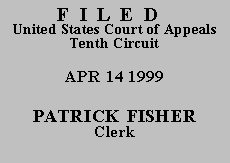

| UNITED STATES OF AMERICA,
v.
TAALIBDIN ABDUL AL-AMIN, also
known as Troy Allen Outlaw |
|
Petitioner, acting pro se, appeals a district court order denying his motion for reconsideration of an order of dismissal that construed his petition as a motion pursuant to 28 U.S.C. § 2255 (1994 & Supp. 1998) to vacate his sentence.
In this court, petitioner Al-Amin seeks a certificate of appealability and has filed a motion for voluntary dismissal of his appeal. We deny a certificate of appealability and deny the motion for a voluntary dismissal.
Petitioner Al-Amin has proceeded pro se throughout the course of this action, which he originally filed in the district court as a "Notice & Ex Parte Petition Pursuant to FRCP Rule 60(b)." He argued that the government fraudulently obtained his guilty plea and that the court should allow him to withdraw the guilty plea based on this circuit's panel opinion in United States v. Singleton, 144 F.3d 1343 (10th Cir. 1998), rev'd en banc, 165 F.3d 1297 (10th Cir. 1999).
On October 20, 1994, petitioner pled guilty in the District of Colorado to an indictment and an information charging a criminal forfeiture. The district court sentenced him to a term of 120 months imprisonment, followed by five years of supervised release. Petitioner did not file a direct appeal from that conviction and sentence. Instead, he filed for a writ of habeas corpus pursuant to 28 U.S.C. § 2241 in the United States District Court for the Southern District of Illinois, claiming that his federal sentence was unlawful. The district court in Illinois determined that because petitioner was attacking his federal sentence, he should have filed a motion under 28 U.S.C. § 2255. The court dismissed the petition without prejudice for lack of jurisdiction. The United States Court of Appeals for the Seventh Circuit summarily affirmed the dismissal. The Seventh Circuit further denied petitioner's motion for reconsideration. Mr. Al-Amin filed a petition for a writ of certiorari which the United States Supreme Court denied in Al-Amin v. Seiter, 118 S. Ct. 1313 (1998). The Supreme Court also denied petitioner's motion for rehearing. See Al-Amin v. Seiter, 118 S. Ct. 1691 (1998).
Following the Supreme Court's denial of certiorari and reconsideration, Mr. Al-Amin filed the "Notice & Ex Parte Petition Pursuant to F.R.C.P. 60(b)" at issue here in the District of Colorado. The district court construed Mr. Al-Amin's petition liberally as a motion pursuant to 28 U.S.C. § 2255 (1994 & Supp. 1998) and denied the petition as barred by the one-year statute of limitations in § 2255. Petitioner subsequently filed a "Motion for Reconsideration" which the district court liberally construed as a Fed. R. Civ. Pro. 60(b) motion seeking relief from judgment. The district court denied this motion, restating its reasons contained in the order of dismissal. We affirm.
We, like the district court, construe appellant's filings in this court liberally because he represents himself. See, e.g., Haines v. Kerner, 404 U.S. 519, 520-21 (1972). The district court generously construed the motion for reconsideration as a motion seeking relief from judgment pursuant to Fed. R. Civ. P. 60(b). We agree that petitioner is not entitled to relief under Fed. R. Civ. P. 60(b) and further agree that the motion in the district court was properly construed as a motion brought pursuant to 28 U.S.C. § 2255. A prisoner whose conviction and sentence became final on or before April 24, 1996 cannot seek relief pursuant to § 2255 unless he or she filed the motion before April 24, 1997. See United States v. Simmonds, 111 F.3d 737, 746 (10th Cir. 1997). Clearly, Mr. Al-Amin's conviction became final well before April 24, 1996, and is time-barred by the one-year limitations period.
This court has reviewed petitioner's request for a certificate of appealability and appellate brief, the district court order, and the entire record on appeal. Our review demonstrates that the district court's orders denying relief are not deserving of further proceedings, debatable among jurists of reason, or subject to different resolution on appeal. See Barefoot v. Estelle, 463 U.S. 880, 893 (1983). Accordingly, petitioner has not made a substantial showing of the denial of a constitutional right and is not entitled to a certificate of appealability. 28 U.S.C. § 2253(c)(1)(b) (1994 & Supp. 1998). Further, because we have acted on the request for a certificate of appealability, we deny appellant's motion for voluntary dismissal.
ENTERED FOR THE COURT,
Deanell Reece Tacha
Circuit Judge
*.This order and judgment is not binding precedent, except under the doctrines of law of the case, res judicata, and collateral estoppel. This court generally disfavors the citation of orders and judgments; nevertheless, an order and judgment may be cited under the terms and conditions of 10th Cir. R. 36.3.